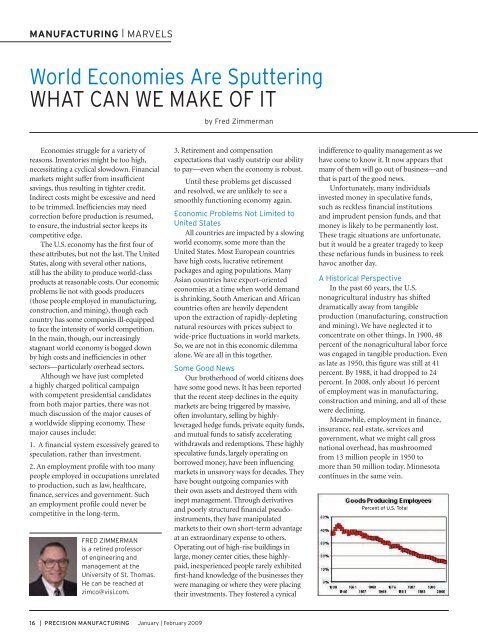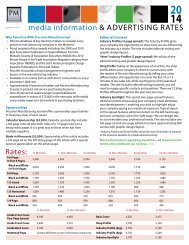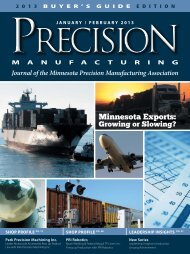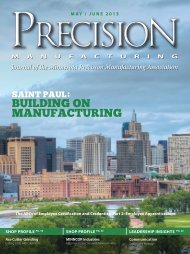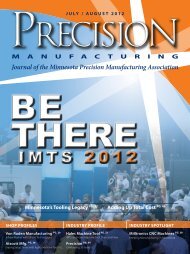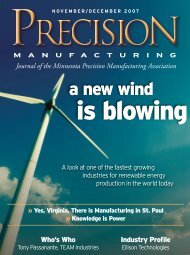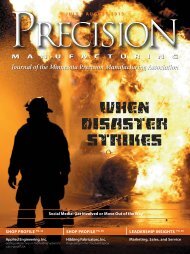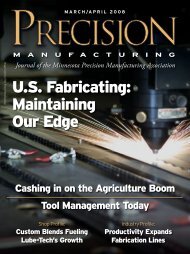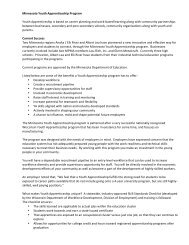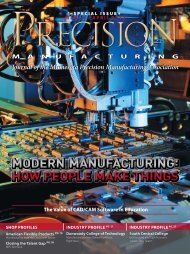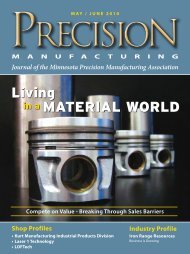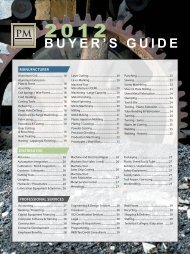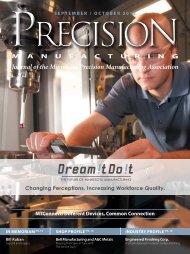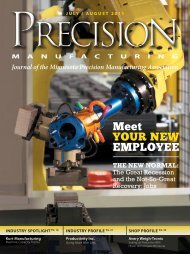MANUFACTURING | MARVELSWorld Economies Are SputteringWHAT CAN WE MAKE OF ITby Fred ZimmermanEconomies struggle for a variety ofreasons. Inventories might be too high,necessitating a cyclical slowdown. Financialmarkets might suffer from insufficientsavings, thus resulting in tighter credit.Indirect costs might be excessive and needto be trimmed. Inefficiencies may needcorrection before production is resumed,to ensure, the industrial sector keeps itscompetitive edge.The U.S. economy has the first four ofthese attributes, but not the last. The UnitedStates, along with several other nations,still has the ability to produce world-classproducts at reasonable costs. Our economicproblems lie not with goods producers(those people employed in manufacturing,construction, and mining), though eachcountry has some companies ill-equippedto face the intensity of world competition.In the main, though, our increasinglystagnant world economy is bogged downby high costs and inefficiencies in othersectors—particularly overhead sectors.Although we have just completeda highly charged political campaignwith competent presidential candidatesfrom both major parties, there was notmuch discussion of the major causes ofa worldwide slipping economy. Thesemajor causes include:1. A financial system excessively geared tospeculation, rather than investment.2. An employment profile with too manypeople employed in occupations unrelatedto production, such as law, healthcare,finance, services and government. Suchan employment profile could never becompetitive in the long-term.FRED ZIMMERMANis a retired professorof engineering andmanagement at theUniversity of St. Thomas.He can be reached atzimco@visi.com.3. Retirement and compensationexpectations that vastly outstrip our abilityto pay—even when the economy is robust.Until these problems get discussedand resolved, we are unlikely to see asmoothly functioning economy again.Economic Problems Not Limited toUnited StatesAll countries are impacted by a slowingworld economy, some more than theUnited States. Most European countrieshave high costs, lucrative retirementpackages and aging populations. ManyAsian countries have export-orientedeconomies at a time when world demandis shrinking. South American and Africancountries often are heavily dependentupon the extraction of rapidly-depletingnatural resources with prices subject towide-price fluctuations in world markets.So, we are not in this economic dilemmaalone. We are all in this together.Some Good NewsOur brotherhood of world citizens doeshave some good news. It has been reportedthat the recent steep declines in the equitymarkets are being triggered by massive,often involuntary, selling by highlyleveragedhedge funds, private equity funds,and mutual funds to satisfy acceleratingwithdrawals and redemptions. These highlyspeculative funds, largely operating onborrowed money, have been influencingmarkets in unsavory ways for decades. Theyhave bought outgoing companies withtheir own assets and destroyed them withinept management. Through derivativesand poorly structured financial pseudoinstruments,they have manipulatedmarkets to their own short-term advantageat an extraordinary expense to others.Operating out of high-rise buildings inlarge, money center cities, these highlypaid,inexperienced people rarely exhibitedfirst-hand knowledge of the businesses theywere managing or where they were placingtheir investments. They fostered a cynicalindifference to quality management as wehave come to know it. It now appears thatmany of them will go out of business—andthat is part of the good news.Unfortunately, many individualsinvested money in speculative funds,such as reckless financial institutionsand imprudent pension funds, and thatmoney is likely to be permanently lost.These tragic situations are unfortunate,but it would be a greater tragedy to keepthese nefarious funds in business to reekhavoc another day.A Historical PerspectiveIn the past 60 years, the U.S.nonagricultural industry has shifteddramatically away from tangibleproduction (manufacturing, constructionand mining). We have neglected it toconcentrate on other things. In 1900, 48percent of the nonagricultural labor forcewas engaged in tangible production. Evenas late as 1950, this figure was still at 41percent. By 1988, it had dropped to 24percent. In 2008, only about 16 percentof employment was in manufacturing,construction and mining, and all of thesewere declining.Meanwhile, employment in finance,insurance, real estate, services andgovernment, what we might call grossnational overhead, has mushroomedfrom 13 million people in 1950 tomore than 50 million today. <strong>Minnesota</strong>continues in the same vein.Percent of U.S. Total16 | PRECISION MANUFACTURING <strong>January</strong> | <strong>February</strong> 2009
The relationship betweenmanufacturing and governmentemployment is a matterof specialinterest. As recently as 1950, the UnitedStates employed about two and a halftimes as many people in manufacturingas in federal, state, county and localgovernments. Today, we have ten millionmore people employed by governmentthan in all of U.S. manufacturing.This critical relationship betweenmanufacturing and governmentemployment is aggravated by the factthat so many people in government retireat an early age, often in their early tomid-50s. Most public retirement planshave not been updated even though 8years has been added to life expectancysince 1960. Many of these enormouspension obligations are underfunded orunfunded. There is no way that even avibrant economy will be able to producethe tax receipts necessary to fulfill theseobligations, let alone a weakened economy.The problem of burgeoning nationaloverhead goes far beyond government,however. We are all part of it. Finance,insurance and real estate employment hasmore than tripled since 1950. Professionaland business service employment hasincreased nearly seven times. Healthcarealso has increased while essential servicesremain unaffordable to many citizens.Education has burgeoned in cost during thesame period and has become less effective.The U.S. school year is among the shortestin the world and our test results compareunfavorably to most developed countries.The growth in service sectoremployment has placed an extreme taxon the people and companies engagedin tangible production. Our problem isnot that our people and companies donot know how to design and build goodproducts. Deere, Caterpillar, Boeing,General Electric, and United Technologiesare arguably the world’s most respectedproducers in their industries. Mercury,Cadillac, Buick, and Lincoln were allamong the top ten models in the world inthe last J.D. Power Dependability Survey.Ford recently replaced Toyota in the topposition in the Initial Quality Survey. Ourability to compete globally is not limited bythe quality of our workers or our technicalexpertise. American manufacturing islimited by exceptionally high overhead cost.High overhead costs are a socialconcern. These costs result in plant closingsand job losses. There is simply no waythat 21 million people engaged in tangibleproduction can supply all of the food,manufactured goods, buildings, roads andraw materials for the 280 million peoplewho are not engaged in production. Thesituation is not sustainable economically.What Must Be DoneWhen any of us examine our situationin depth, we are left with the inescapablearithmetic conclusion that our economywill never get better until we achievebetter operational quality in our serviceindustries, coupled with some majorreordering of our employment profile,retirement practices and compensation.Survival is dependent upon massivequality and productivity improvementsin law (fewer frivolous lawsuits), finance(more responsible behavior on the partof financial companies), education,government, healthcare and many otherservices. It is valid for customers to beconcerned about the quality of theirmanufactured goods. It is equally validfor citizens to be concerned about thequality and value in other sectors.The business news of today is notfocused on whether or not the UnitedStates can produce world-class products.It is focused on the great tragedies thathave unfolded in banking, finance,auditing and government. Our preciouseconomy is stagnating because of sloppyperformance and high cost in theseindustries. Ironically, it is these poorlyperforming industries that have receivedthe vast majority of governmental help.I am sure we all wish the best forthe new administration that will beginleading our country in <strong>January</strong>. Oureconomic circumstances demand thatwe pull together to make some of theimprovements so desperately needed inregulation and in other areas. It will beunfortunate and unproductive; however,if none of us are willing to modify ourbehaviors and expectations. Those of usin education should work a full year andbe more conscientious. Courts need tobe more practical. Retirement ages for allprofessions should be expanded to at least70 years. Our compensation will needto be more realistic—particularly at theexecutive level but also for many others.As a practical matter, the remediesto our economic difficulties need not benew, as this 2,063-year-old quote fromCicero would attest:“The budget should be balanced,the Treasury should be refilled, publicdebt should be reduced, the arroganceof officialdom should be tempered andcontrolled, and the assistance to foreignlands should be curtailed lest Rome becomebankrupt. People must again learn to work,instead of living on public assistance.”Cicero , 55 BC PMGraphs prepared by the author from datareleased by the Bureau of Labor Statistics2008.<strong>January</strong> | <strong>February</strong> 2009 PRECISION MANUFACTURING | 17
- Page 3 and 4: TABLE | OF CONTENTSJanuary|February
- Page 5 and 6: The FEDERATED Insurance Companies
- Page 7 and 8: For many companies, hiring veterans
- Page 9 and 10: At Top Tool Company in Blaine, 30 p
- Page 11 and 12: WH IRING VETERANS: RESOURCES FOR E
- Page 13: Emerging Abrasives TechnologySaddle
- Page 18 and 19: SHOP | PROFILEIndustrial Waste Serv
- Page 20 and 21: FEATURE | ELECTION’S IMPACTbyMeli
- Page 23 and 24: GREATINNOVATIONSBEGIN WITHSIMPLE ID
- Page 25 and 26: Martin Calibration is ISO-17025accr
- Page 27 and 28: MPMA | HIGHLIGHTSWHAT’S HAPPENING
- Page 29 and 30: M A N U F A C T U R I N G2009BUYER
- Page 31 and 32: BUYER’S | GUIDEABRASIVESAbrasive
- Page 33 and 34: BUYER’S | GUIDEHibbing Fabricator
- Page 35 and 36: BUYER’S | GUIDELou-Rich, Inc.Rand
- Page 37 and 38: BUYER’S | GUIDEToolkraft, Inc.Wil
- Page 39 and 40: Industry Profi leMasterGraphics Inc
- Page 41 and 42: Industry Profi leMasterGraphics Inc
- Page 43 and 44: BUYER’S | GUIDEMICROMACHININGcont
- Page 45 and 46: BUYER’S | GUIDEQuality Machineof
- Page 47 and 48: Deburring, Cleaning orFinishing Pro
- Page 49 and 50: Knowledgeable People+Quality Produc
- Page 51 and 52: BUYER’S | GUIDEChallenge Machine
- Page 54 and 55: BUYER’S | GUIDESAWINGcontinuedPre
- Page 56 and 57: BUYER’S | GUIDETURNINGcontinuedCa
- Page 58 and 59: BUYER’S | GUIDETURNING, SWISScont
- Page 60 and 61: MANUFACTURERS’ | MARKETPLACEINDUS
- Page 62 and 63: MEMBER | DIRECTORYLifetimeMembersDr
- Page 64 and 65: MEMBER | DIRECTORYCarley Foundry, I
- Page 66 and 67:
MEMBER | DIRECTORYDunwoody Collegeo
- Page 68 and 69:
MEMBER | DIRECTORYJet Edge, Inc.Nan
- Page 70 and 71:
MEMBER | DIRECTORYMicroGroup Bethel
- Page 72 and 73:
MEMBER | DIRECTORYPal’s Machining
- Page 74 and 75:
MEMBER | DIRECTORYQDP Technologies,
- Page 76 and 77:
MEMBER | DIRECTORYTEAM IndustriesJi
- Page 78 and 79:
MEMBER | DIRECTORYW.P. & R.S. Mars
- Page 80:
7600 Anagram DriveEden Prairie, MN


